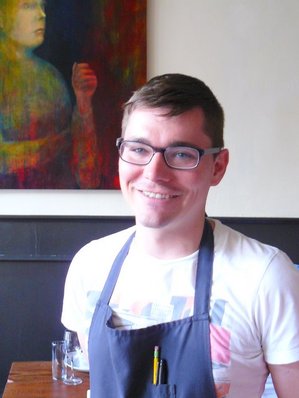 An ounce or so, a fistful, of ever-so-thin noodles, nothing more than flour and egg yolks rolled out and hand-cut mid-afternoon, gets immersed for perhaps 30 seconds in lightly salted water that is boiling vigorously in a pasta cooker at the southwest corner of the kitchen. In a sauté pan atop a nearby burner, the simmering sauce of melted butter and sage leaves awaits, like a patient but seething lover.
An ounce or so, a fistful, of ever-so-thin noodles, nothing more than flour and egg yolks rolled out and hand-cut mid-afternoon, gets immersed for perhaps 30 seconds in lightly salted water that is boiling vigorously in a pasta cooker at the southwest corner of the kitchen. In a sauté pan atop a nearby burner, the simmering sauce of melted butter and sage leaves awaits, like a patient but seething lover.
The 30-year-old chef at the stove delivers the dripping pasta into the arms of the sauce; then, holding a kitchen fork, he stirs the ribbons with a practiced swirl, scoops in some of the cooking water; gives the pan a light swoosh, and tips the pasta onto a plate. A brief pause at the passe (a butcher block at the front of the kitchen) so the dish can get a shower of Parmigianno, then it's whisked into the dining room.
It is like eating a cloud. Each strand is carressed with buttery sauce; the bright yellow pasta tastes impossibly lemony. It is rich, it is light, it is dense, it is gossamer. It is better than any pasta you have ever tasted, and you want the moment to last forever. Then you're finished, that's it; a sip of Nebbiolo and the rest is afterglow.
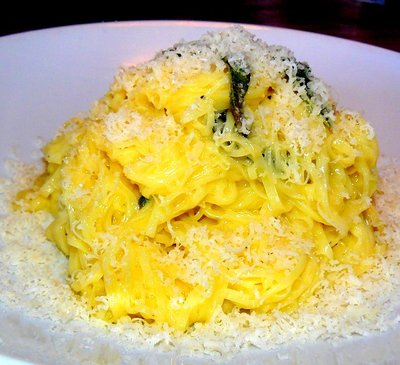 We are at Cascina Spinasse, on Capitol Hill, a restaurant that owes its life not to the young prince at the stove tonight but to a cook named Justin Niedermeyer, a visionary who tried for years to open a restaurant devoted to his love of handmade pasta, only to find, soon after he opened Spinasse two years ago, that the day-to-day business of actually running a restaurant made him miserable. Enter Jason Stratton, on hand on opening night as the maitre d'hôtel, at 28 already a five-year veteran of Holly Smith's Café Juanita, awaiting the opening of Jerry Traunfeld's Poppy, where he'd been hired as sous-chef and where he would soon take up his station.
We are at Cascina Spinasse, on Capitol Hill, a restaurant that owes its life not to the young prince at the stove tonight but to a cook named Justin Niedermeyer, a visionary who tried for years to open a restaurant devoted to his love of handmade pasta, only to find, soon after he opened Spinasse two years ago, that the day-to-day business of actually running a restaurant made him miserable. Enter Jason Stratton, on hand on opening night as the maitre d'hôtel, at 28 already a five-year veteran of Holly Smith's Café Juanita, awaiting the opening of Jerry Traunfeld's Poppy, where he'd been hired as sous-chef and where he would soon take up his station.
Back at Spinasse, there's no gaudy sidewalk treatment, just a storefront on 14th Avenue where the Globe Café had once dished out vegan fare. Inside, a stage set: a marble-topped bar with seats for six, flanked by butcher-block working surface that doubles as seating for four more. Beyond the bar, framed by a proscenium of bottles and glassware, the kitchen itself, the showy domain of the chefs. On a recent night, half a dozen of them.
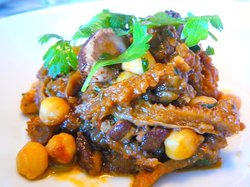 Pasta, you say? Not so fast. Antipasti first: salads, cured meats, and to my delight, an amazing "rich man, poor-man" dish of tripe and foie gras. Tripe, indeed, slow-cooked until it's as tender as a mushroom, enhanced by the richness of the liver, the mouthfeel, offset with spheres of chickpeas, downright playful. Worth a profile of its own; it takes three days to make.
Pasta, you say? Not so fast. Antipasti first: salads, cured meats, and to my delight, an amazing "rich man, poor-man" dish of tripe and foie gras. Tripe, indeed, slow-cooked until it's as tender as a mushroom, enhanced by the richness of the liver, the mouthfeel, offset with spheres of chickpeas, downright playful. Worth a profile of its own; it takes three days to make.
Now the pasta. It's made with many, many egg yolks and rolled, not extruded. That means no round noodles, only flat sheets, and cut by hand at that. The tajarin are like tagliatelle only finer, and served with a basic ragù or a butter sauce. "It has to be perfect," Stratton explains.
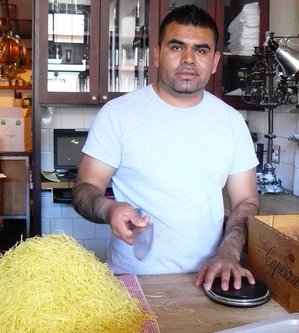 A no-nonsense gent named Martin Islas is in charge of this essential function: gathering up the sheets of silky, golden pasta as if they were sacred shawls or priestly vestments, then loosely rolling the sheets and cutting them by hand. Surely there is a recipe, and just as surely the minute adjustments made for ambient temperature and humidity. Egg yolks, flour, and the knowing hand of experience. There are, of course, other restaurants in Seattle with housemade pasta, homebaked bread or pizza spun from handmade dough, but Spinasse represents a major paradigm shift for authentic Italian cooking in Seattle: no longer the exclusive province of immigrant families or culinary-school Italian.
A no-nonsense gent named Martin Islas is in charge of this essential function: gathering up the sheets of silky, golden pasta as if they were sacred shawls or priestly vestments, then loosely rolling the sheets and cutting them by hand. Surely there is a recipe, and just as surely the minute adjustments made for ambient temperature and humidity. Egg yolks, flour, and the knowing hand of experience. There are, of course, other restaurants in Seattle with housemade pasta, homebaked bread or pizza spun from handmade dough, but Spinasse represents a major paradigm shift for authentic Italian cooking in Seattle: no longer the exclusive province of immigrant families or culinary-school Italian.
The menu degustazione is a family-style tasting of everything on the menu (every antipasto, primo and secondo); it's $90 per person. Last month, for the restaurant's second anniversary, there was another option (in addition to the à la carte menu): a five-course, $65 prix fixe (yes, you get tajarin--with chanterelles--and, as a main course, rabbit meatballs with polenta). You can also sign up for "Chef's Counter," another everything-on-the-menu option for a single table of two or four, $100, with Stratton himself as the server.
On Tuesdays, Spinasse becomes an "event venue." Once a month, a cooking class (September 21st, vegetables, $45) or a special dinner (November 9th: family-style tajarin feast, $30). Or book the place for a party of your own.
The wine list, it must be said, is exceptional in its focus on Piedmont. If you think of Piedmont as red wine country, you're missing out on several of Italy's finest whites: Arneis, Gavi, Erbaluce, sparkling Cortese. And if you've never ventured beyond Nebbiolo (the great grape of Barolo and Barbaresco), you're missing out on Barbera and Dolcetto. Spinasse offers a panoply of great bottles but a dozen by-the-glass pours as well; there's probably no better value in town than the 2006 Barbaresco "Torre" from the cooperative Produttori des Barbaresco at $15. Cascina, by the way, doesn't refer to the the city in Tuscany on the main road between Pisa and Florence, but to a rustic, wine-making estate in the northern provinces of Italy. Spinasse is a corruption of local terms for spinach: spinaci in Italian, Spinat in German.
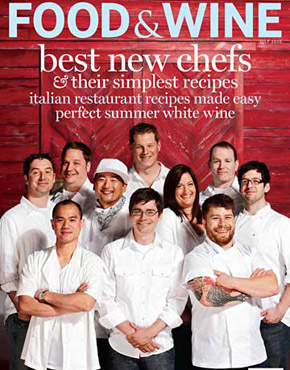 Earlier this year, Stratton and his sous-chef, Carrie Mashaney, competed in a TV reality show called "Chefs vs. City." They didn't "win," but Stratton got national exposure. An even bigger coup came shortly after the segment finished taping: Food & Wine named Stratton one of the top ten new chefs in the country. The profile that accompanies his picture gives little hint of his astonishing competence and precocious command of the kitchen. His mother, he says, "was always determined to feed us well even though there were times we couldn't eat much." Holly Smith, his mentor at Café Juanita, tought him how to season well and be fearless in the kitchen. But Jerry Traunfeld of Poppy, who hired Stratton sight unseen, based on an email, explains that his protégé seemed to possess something beyond technique, "something that just knows how to make food taste good."
Earlier this year, Stratton and his sous-chef, Carrie Mashaney, competed in a TV reality show called "Chefs vs. City." They didn't "win," but Stratton got national exposure. An even bigger coup came shortly after the segment finished taping: Food & Wine named Stratton one of the top ten new chefs in the country. The profile that accompanies his picture gives little hint of his astonishing competence and precocious command of the kitchen. His mother, he says, "was always determined to feed us well even though there were times we couldn't eat much." Holly Smith, his mentor at Café Juanita, tought him how to season well and be fearless in the kitchen. But Jerry Traunfeld of Poppy, who hired Stratton sight unseen, based on an email, explains that his protégé seemed to possess something beyond technique, "something that just knows how to make food taste good."
Stratton has plenty of competent help. Half a dozen cooks and apprentices in the kitchen every night; an expert, deceptively informal staff in the dining room; and an experienced business manager, Michael Galloway, who says, "Jason really understands the restaurant business, labor, food costs, inventory control. And he's a great teacher."
Stratton doesn't own Spinasse, so it's hard to tell what might change if he did. He might, one day, have his own cozy little place, "Chez Jason," one assumes, rather than "Stratton's Steakhouse." Stratton told Food & Wine that he wants to have a restaurant that showcases the history of food. "I'd look at colonial empires and trade routes and the discovery of the New World. Mediterranean food--that's really fusion food." Certainly a noble goal, but it's a slippery slope from a kitchen of one's own to "gotta be practical" compromises, to loss of independence and eventual ruin. Stratton's food is labor-intensive, which requires a lot of cooks in the kitchen; the high labor cost translates to relatively high prices, which then require a seamless level of service (because diners who spend that kind of money need to be cosseted). To make those costs pencil out, you need a spot busy enough to do two turns a night (80 to 100 covers, at Spinasse), which in turn requires a strong, steady buzz through a combination of notoriety and PR. It's more than any truly independent, no-outside-money, sole proprietor in Seattle can afford (with the exception of Kevin and Teressa Davis, of Steelhead Diner and Blueacre). The only way to make it happen is with outside investors, which is precisely where Cascina Spinasse stands today. Not that there's anything wrong with that.
Fortunately, Stratton is a poet as well as a chef, someone who sees what others don't. On the wall in a narrow corridor behind the kitchen, there's this composition:
TATTOOS
It makes me happy to see
that so many tattoos
are handmade crosses
either burned or blotted in
muddy green with a needle and a marker
I think that Jesus must have
a special place in his heart
for dads who don't shave much in the summer,
but play dominoes around those card tables
with the fold-up legs.
For now, until some corporate Cinderella takes him away, and makes him shave in summer, Jason Stratton is Seattle's Prince Charming who keeps his musings, like his recipes, in secret notebooks.

Leave a comment